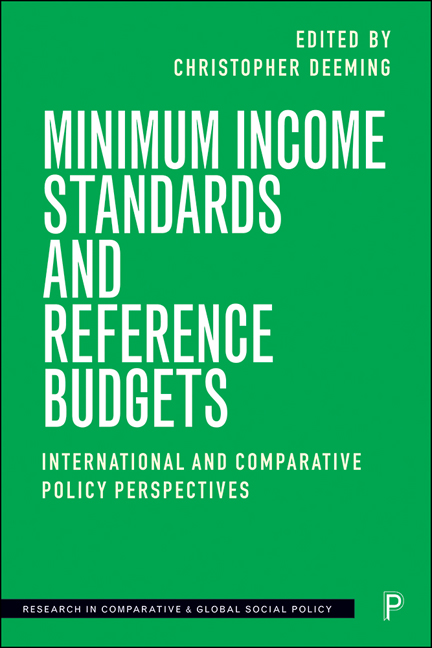5 - Minimum Income Research in Japan: Its Development and Political Implications
Published online by Cambridge University Press: 12 March 2021
Summary
The inception and motivation for Minimum Living Standard research in Japan
The question of how much income is adequate to meet the minimally accepted standard of living has been an issue of fierce debate for decades in Japan. It is not only an interesting academic question, but also a political question which has direct impact on policies and budget outlay of the governments. This is so because the Public Assistance programme in Japan uses the concept of Minimum Living Standard (MLS) as the income threshold for the eligibility to receive the benefit, and also in determining the amount of the benefit. The MLS is a concept similar to the Minimum Income Standard (MIS), but to distinguish it as a standard, especially as used administratively in the Public Assistance programme in Japan, we will call it the MLS. The benefit amount is equal to the difference between the MLS and the sum of earnings, social security payments, pensions and other income. Thus, since the inception of the (New) Public Assistance Law in 1951, the question of MLS has always been on the administrative and political agenda.
The interest in the UK MIS methodology (Chapter 2) was kindled amid such debate. In 2009, the Democratic Party won a landslide election victory over the longstanding conservative party (the Liberal Democratic Party), and became the first liberal government to be in power after World War II. The new government was keen to review the methodology for setting the MLS of the Public Assistance programmes. In late 2009, the Minister for Health, Labour and Welfare summoned a Research Committee on a National Minimum from academia and Prof Masami Iwata (then of the Japan Women's University) mentioned the MIS research in the UK (MHLW, 2009). In 2010, the Ministry of Health, Labour and Welfare commissioned the National Institute of Population and Social Security Research, a research arm of the ministry, to conduct MIS for Japan. The project team was headed by the author and the team conducted a series of MIS research over the next few years (Abe et al, 2012).
- Type
- Chapter
- Information
- Minimum Income Standards and Reference BudgetsInternational and Comparative Policy Perspectives, pp. 67 - 82Publisher: Bristol University PressPrint publication year: 2020



